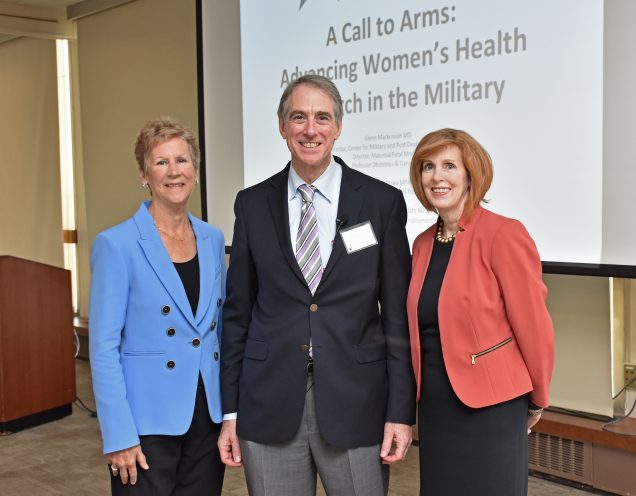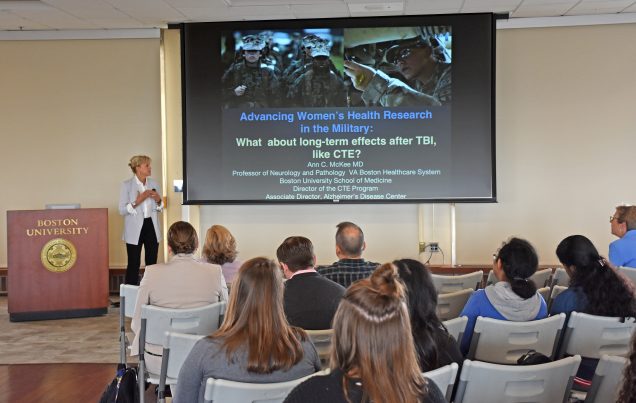Military Women’s Health Symposium Explores Gaps in Research

A day-long symposium focused on the health of active-duty women and female veterans, A Call to Arms: Advancing Women’s Health Research in the Military, was held Sept. 13 on the Medical Campus. Approximately 40 students, faculty experts from Boston University, Boston Medical Center and the Uniformed Services University of the Health Sciences as well as military veterans attended sessions that discussed some of the more recognized conditions of war such as Post Traumatic Stress Disorder (PTSD) and brain injury, as well as lesser-known after-effects such as cancer and poor perinatal health and their impacts on women who serve.
Director of the Center for Military and Post Deployment Health Col. Glenn Markenson, MD, who also serves as Professor of Obstetrics and Gynecology opened the symposium. “The mission of the Center is really to set forth interdisciplinary research plans and develop educational programs within the Boston community,” he said. As a retired colonel with more than 25 years in the military, Dr. Markenson has hands-on experience regarding the unique health concerns of service members, both during war and peacetime operations, and is interested in research to improve the health of military personnel, especially women members. “There’s huge gaps in research in war fighters that happen to be women. A lot of the research focuses on men,” said Dr. Markenson. “We as a Center want to be there as a resource for you.”
After introducing the keynote speakers, Dr. Markenson finished his opening remarks saying, “I will tell you both those women are extremely passionate about what they do. Through and through they care about veterans.” The speakers, Kathryn M. Beasley, PhD, Capt. USN (Ret) and Tracy Malone, Vice President of UnitedHealth Group, discussed health outcomes of women in the military. Some of the more specific topics they explored included the health differences between women and men who have served regarding mental health. “One of the striking things that we noticed was that there were some specific challenges for women, particularly depression and frequent mental distress.”
Dr. Beasley and Ms. Malone contributed to a report on the health of women with US military experience that provides key insights into the health of women who have served in the Armed Forces as compared to women who have not served, specifically looking at areas pertaining to behaviors, community & environment, policy and clinical care.
The research found that women who have served are more likely to report being in very good or excellent health. “Minority women are more likely to report being in better health than their civilian counterparts,” said Dr. Beasley. “However women who have served face greater mental health challenges than their peers.” The report found that women who have served have a 42 percent higher rate of having a mental illness in the past year and have a 16 percent higher rate of having ever been diagnosed with depression than civilian women.
“Overall women who have served are twice as likely to have suicidal thoughts than those who haven’t served,” said Dr. Beasley. “Women who have served are also more likely to be depressed than civilian women.” The report also showed that women veterans have greater access to and utilization of preventive services and health coverage. The research also found that these veterans have a 16 percent higher rate of arthritis, cancer and cardiovascular disease than women who have not served. “The report’s findings are intended to help us understand the health of military women to improve measures to help their well being,” said Dr. Beasley.
Other speakers included Ann McKee, MD, Director of Neuropathology at VA Boston Healthcare System and BUSM Professor of Neurology and Pathology, who discussed chronic traumatic brain injury. “We don’t know anything about CTE (Chronic Traumatic Encephalopathy) in women,” she said. “There is a real research gap in looking at women’s brains.”

Tracey Dechert, MD, Assistant Professor of Surgery in Trauma & Critical Care, discussed blunt trauma outcomes. “When you look more specifically at women in trauma, there’s a huge number of women dying of injury.”
Kimberly Sullivan, PhD, BUSPH Research Assistant Professor of Environmental Health, addressed Gulf War illness and chronic conditions. “We know the Gulf War illness affects about a third of Gulf War veterans,” she said.
Amy Street, PhD, Associate Professor of Psychiatry, discussed PTSD, combat and military sexual trauma. One of the questions driving her research is “How does military sexual trauma impact veterans?” She found that the level of PTSD between women and men was shockingly similar and that women were more at risk for depression than men.
Cassidy Gutner, PhD, Assistant Professor of Psychiatry, discussed the psychosocial treatment for PTSD. “There’s room for improvement in psychosocial treatment response,” said Dr. Gutner.
Dr. Markenson closed the symposium with a discussion about military reproductive outcomes, preterm birth rates of military women, birth defects with women in the Gulf War and postpartum depression in military women. “Now we need to try to develop research strategies that can explore these gaps in care.”